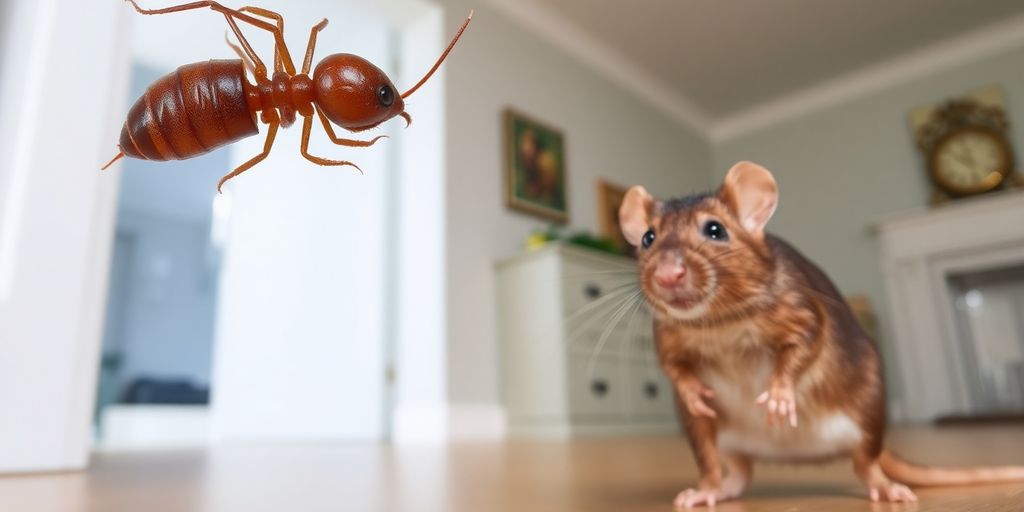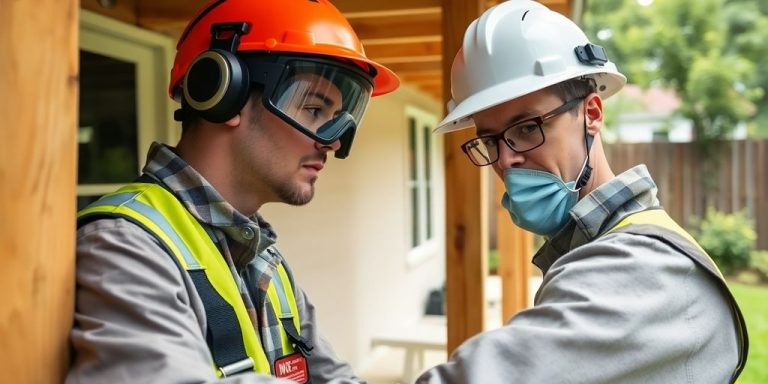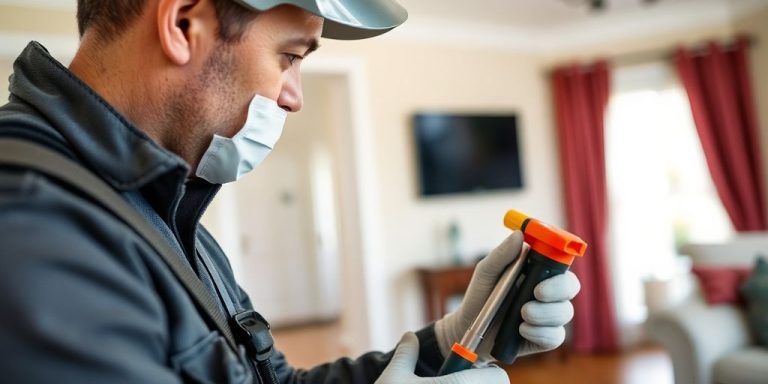Keeping your home safe from pests like termites and rodents is crucial for maintaining a healthy living environment. Understanding their behavior, implementing preventive measures, and knowing when to seek professional help can significantly reduce the risk of infestations. This article will explore effective strategies for termite and rodent control, ensuring your home remains pest-free.
Key Takeaways
- Regular inspections can help catch termite and rodent problems early.
- Seal all entry points to prevent pests from getting inside.
- Maintain cleanliness to discourage rodents from nesting in your home.
- Consider eco-friendly solutions for pest control to protect the environment.
- Professional pest control services can provide effective long-term solutions.
Understanding Termite and Rodent Behavior
Lifecycle of Termites
Termites undergo a fascinating life cycle that consists of several stages:
- Egg: The queen lays eggs, which hatch into larvae after a few weeks.
- Larvae: These larvae grow and develop into different castes: workers, soldiers, or reproductive termites.
- Worker: Workers are responsible for foraging for food, building nests, and caring for the queen and other termites.
- Soldier: Soldiers protect the colony from threats using their strong mandibles.
- Reproductive: Also known as alates, these termites swarm to create new colonies.
Common Rodent Species
Rodents are common pests that can invade homes. Here are a few species to be aware of:
- House Mouse: Small and agile, they can squeeze through tiny openings.
- Norway Rat: Larger and more aggressive, they often live in burrows.
- Roof Rat: Known for climbing, they can access attics and roofs easily.
Signs of Infestation
Recognizing the signs of termite and rodent infestations is crucial for early intervention:
- Termite Signs:
- Mud tubes leading to food sources.
- Blistered wood surfaces.
- Discarded wings near windows or doors.
- Rodent Signs:
- Droppings found in hidden areas.
- Gnaw marks on food packaging or furniture.
- Noises in walls or ceilings at night.
Understanding the behavior of termites and rodents is essential for effective control. By knowing their life cycles and signs of infestation, homeowners can take proactive steps to protect their homes.
Remember: Rats are clever creatures capable of opening cabinet doors and accessing food, so it’s vital to secure food in airtight containers and keep kitchens clean to deter these pests.
Preventive Measures for Termite and Rodent Control

Sealing Entry Points
To keep pests out, seal any gaps in your home. Rodents can fit through tiny holes, so check around doors, windows, and vents. Use materials like steel wool or caulk to close these openings. This simple step can significantly reduce the chances of an infestation.
Reducing Moisture Levels
Termites love damp places. To deter them, fix leaks and ensure proper drainage around your home. Keep gutters clean and maintain good airflow in crawl spaces and basements. A dry home is less inviting to these pests.
Using Termite-Resistant Materials
When building or renovating, consider using termite-resistant materials. Pressure-treated wood or naturally resistant wood types can help protect your home from termite damage. This proactive approach can save you from costly repairs later on.
Regular maintenance and inspections are key to preventing infestations. By taking these steps, you can create a safer environment for your family and home.
Summary of Preventive Measures
| Measure | Description |
|---|---|
| Seal Entry Points | Close gaps around doors, windows, and vents. |
| Reduce Moisture Levels | Fix leaks and ensure proper drainage. |
| Use Termite-Resistant Materials | Choose materials that deter termites. |
DIY Methods for Managing Termite and Rodent Infestations

Homemade Traps and Baits
For those looking to tackle pest problems on their own, creating homemade traps and baits can be an effective approach. Here are some methods you can try:
- Cardboard Traps: Wet cardboard can attract termites. Once they infest the cardboard, simply burn it to eliminate them.
- Boric Acid: This powder can be sprinkled around infested areas. It acts as a poison when ingested by termites.
- Snap Traps: For rodents, mechanical traps like snap traps can be placed in areas where you notice signs of activity.
Natural Repellents
Using natural repellents can help deter both termites and rodents without harmful chemicals. Consider these options:
- Neem Oil: This oil disrupts the hormonal balance of termites, eventually leading to their demise.
- Peppermint Oil: For rodents, peppermint oil can be used as a spray around entry points to keep them away.
- Orange Oil: Extracted from orange peels, this oil can kill termites on contact and is safe for humans and pets.
Limitations of DIY Approaches
While DIY methods can be helpful, they often have limitations. Here are some points to consider:
- Effectiveness: DIY methods may not be as thorough as professional treatments, especially for severe infestations.
- Time-Consuming: Managing infestations on your own can take a lot of time and effort.
- Risk of Damage: Improper use of DIY methods can lead to damage in your home or harm to pets.
Remember, while DIY methods can provide temporary relief, they may not address the root of the problem. For serious infestations, consulting a professional is often the best course of action. If you notice signs of infestation, take action quickly to prevent further damage.
Professional Termite and Rodent Control Services
Comprehensive Inspections
Professional pest control services begin with thorough inspections of your home. These inspections are crucial for identifying potential problem areas. Experts look for signs of termite activity, such as mud tubes and damaged wood, as well as rodent entry points. Regular inspections help catch infestations early, preventing costly damage.
Advanced Treatment Options
Once an infestation is confirmed, pest control professionals use advanced treatment methods tailored to your situation. These may include:
- Baiting systems for termites that attract and eliminate the colony.
- Rodent traps and baits that are strategically placed to ensure effectiveness.
- Chemical treatments that are safe for your family and pets but deadly to pests.
Benefits of Professional Monitoring
Hiring professionals for pest control offers several advantages:
- Expert Knowledge: Professionals understand pest behavior and can provide effective solutions.
- Customized Plans: Services are tailored to your specific needs, ensuring better results.
- Ongoing Support: Regular monitoring helps prevent future infestations, giving you peace of mind.
Professional pest control services not only eliminate current infestations but also help protect your home from future threats.
In conclusion, investing in professional termite and rodent control services is essential for maintaining a safe and healthy home environment. With their expertise, you can effectively manage pest problems and safeguard your property from damage.
Eco-Friendly Solutions for Termite and Rodent Control

Using Orange Oil and Borates
For those who care about the environment, there are effective and natural solutions for controlling termites. Orange oil, derived from orange peels, can kill termites on contact and is safe for both humans and pets. Another option is borates, which are natural mineral salts that can be applied to wood, making it toxic to termites and preventing infestations.
Beneficial Nematodes for Termites
Beneficial nematodes are tiny worms that prey on termites. They can be introduced into the soil around your home to help control termite populations. This method is not only effective but also safe for the environment, making it a great choice for eco-conscious homeowners.
Safe Rodent Control Practices
When it comes to managing rodent issues, there are several eco-friendly practices to consider:
- Seal Entry Points: Inspect your home for gaps and cracks, and seal them with materials like steel wool or caulk to prevent rodents from entering.
- Maintain Cleanliness: Keep your home tidy and free of clutter. Regularly vacuum and clean up food spills to eliminate potential food sources for rodents.
- Use Traps: Mechanical traps, such as snap traps, can effectively capture rodents without using harmful chemicals.
Keeping your home pest-free is not just about eliminating existing infestations; it’s also about creating an environment that discourages pests from returning. Regular inspections and proper sanitation are key to maintaining a pest-free home.
By implementing these eco-friendly solutions, you can effectively manage termite and rodent issues while being kind to the planet. Taking proactive steps will help ensure your home remains a safe and healthy space for you and your family.
Maintaining a Pest-Free Home Environment

Keeping your home free from pests is essential for a healthy living space. Here are some effective strategies to maintain a pest-free environment:
Regular Home Inspections
- Inspect your home regularly for signs of pests, such as droppings or nests.
- Check areas like attics, basements, and behind appliances where pests might hide.
- Look for any damage to wood or insulation that could indicate termite activity.
Proper Waste Management
- Always dispose of food waste properly to avoid attracting pests.
- Use sealed containers for trash and compost to keep rodents and insects away.
- Clean up spills and crumbs immediately to eliminate food sources for pests.
Landscaping Tips to Deter Pests
- Keep plants trimmed and away from the house to reduce hiding spots for pests.
- Use mulch sparingly, as it can attract termites and other pests.
- Consider planting pest-repelling plants, such as marigolds or mint, around your home.
Maintaining a clean and organized home is crucial. A tidy space not only deters pests but also promotes a healthier environment for you and your family.
By following these steps, you can significantly reduce the chances of pests invading your home. Remember, prevention is always better than dealing with an infestation later!
Final Thoughts on Termite and Rodent Control
Keeping your home safe from termites and rodents is really important for your health and comfort. By following the tips we’ve discussed, like sealing up holes, keeping food stored properly, and maintaining a clean environment, you can help stop these pests from invading your space. If you find that the problem is too big to handle on your own, don’t hesitate to call in the experts. They have the right tools and knowledge to deal with these pests effectively. Remember, taking action early can save you a lot of trouble and money in the long run. Stay vigilant, and enjoy a pest-free home!
Frequently Asked Questions
What are the signs that I have a termite problem?
Look for mud tubes, discarded wings, or damaged wood in your home. If you see these signs, it might mean you have termites.
How can I prevent rodents from entering my home?
Seal up any holes or cracks, keep food stored in airtight containers, and maintain a clean environment to deter rodents.
Are DIY pest control methods effective?
DIY methods can work for small problems, but they may not be as effective as hiring a professional for serious infestations.
What should I do if I find termites in my home?
Contact a pest control expert immediately to assess the situation and recommend treatment options.
How often should I have my home inspected for pests?
It’s a good idea to have your home inspected at least once a year to catch any potential issues early.
What eco-friendly solutions are available for pest control?
You can use natural repellents like orange oil, beneficial nematodes, and borates to control pests without harming the environment.




